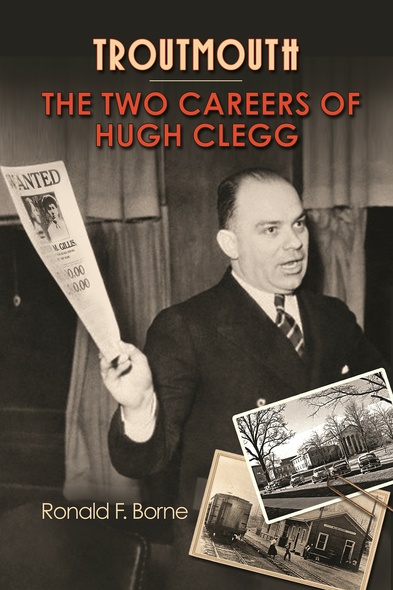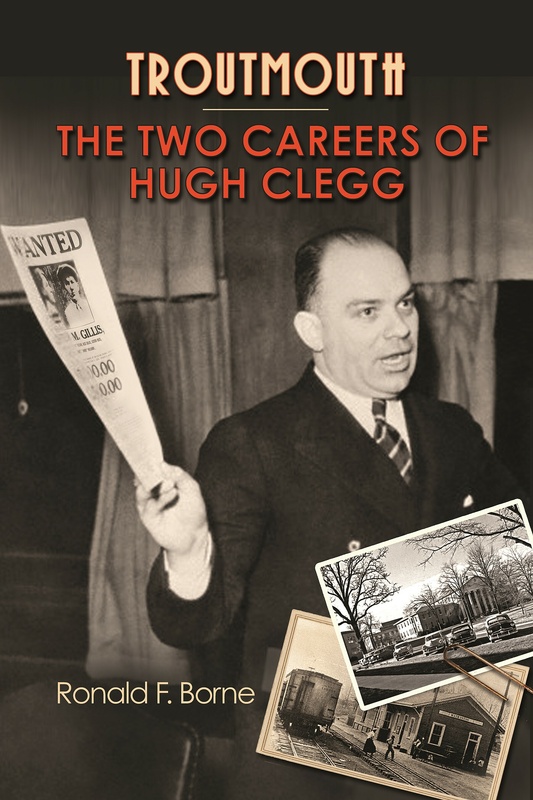Hugh Clegg (1898-1979) was among the most notable Mississippi historical figures during the 1920s through the 1960s. Born in Mathiston, Mississippi, he was a member of the Federal Bureau of Investigation from 1926 to 1954, during which time he rose to the top leadership and worked directly under Director J. Edgar Hoover and Associate Director Clyde Tolson. In his second career, as executive assistant to Chancellor J. D. Williams at the University of Mississippi from 1954 to 1969, he was in a top leadership position before and during the civil rights crises in the State of Mississippi and at Ole Miss.
While with the Bureau, Clegg’s responsibilities included leading the search for many of the most dangerous gangsters in the country, including John Dillinger, Baby Face Nelson, the Barker gang, and Alvin Karpis. He established the FBI’s National Training Academy and coordinated the hunt for atom bomb spy Harry Gold, collaborator with German spy Emil Klaus Fuchs. He was sent to England by Director Hoover prior to the outbreak of World War II to study British intelligence agencies.
A close friend of many of the leading federal and state elected officials and of members of the US Supreme Court, Clegg was well known to many in power. At the University of Mississippi he was the prime contact between the university and the federal government during the desegregation crises of Clennon King and James Meredith. He was also assigned the lead role in combating the efforts of Mississippi politicians to discredit and remove faculty members when scholars were thought "too liberal" and therefore a threat to the state.
Through a Freedom of Information request from the FBI, author Ronald F. Borne obtained thousands of pertinent documents. In addition, he mined Clegg’s oral history and an unpublished book manuscript. Borne interviewed close relations, colleagues, and friends to reveal a portrait of a distinguished, loyal man who significantly shaped the training procedures for the FBI and then mediated the University of Mississippi’s conflicts with both state officials and the federal government.
I have read many books about ‘Ole Miss’ and ‘James Meredith.' This one is the best! Now I know what ‘James Meredith' did at ‘Ole Miss’ in 1962, and why Mississippi will lead the nation in reaching the goal of the Founding Fathers of ‘equality' for every citizen.
I was eighteen years old working outside of Hugh Clegg’s office in the Lyceum. He was a giant of a man, and I did all I could to avoid even seeing him, until one day I saw the humanity of this great man when he apologized to a young reporter who he had briefly not treated properly. I worked for Mr. Clegg until his retirement and was there with him during the riots, but I never knew or realized until many years later who he really was and what role he played in the admission of James Meredith to Ole Miss. He was from the mold of J. Edgar Hoover, but with the utmost in integrity so critical to Ole Miss during this critical period in our state’s history.
Ron Borne has done us all a terrific service by resurrecting and so thoroughly researching the life of Webster County Mississippi’s Hugh Clegg. From Bennett Academy in Mathiston to Washington, DC’s halls of power, Clegg’s meteoric rise in a fledgling FBI to J. Edgar Hoover confidant reflects the remarkable journey of a man whose competence was matched only by his capacity for loyalty. Hugh Clegg’s faithful return to Oxford and Ole Miss in a time of crisis bears witness to the axiom that for Mississippians ‘you can go away but you can never get away.'
Ronald F. Borne is a medicinal chemist who served the University of Mississippi in several teaching, research, and administrative positions. He has written approximately one hundred professional and scientific publications as well as several nonprofessional articles and two books: Beginnings & Ends and The Great College Coaches Cookbook.






